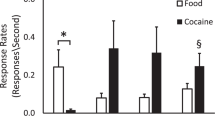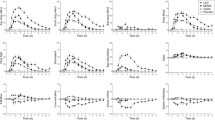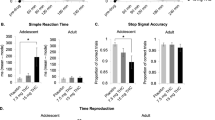Abstract
Many attempts to obtain reliable self-administration behavior by laboratory animals with delta-9-tetrahydrocannabinol (THC), the psychoactive ingredient in marijuana, have been unsuccessful1,2,3,4,5. Because self-administration behavior has been demonstrated in laboratory animals for almost all other psychoactive drugs abused by humans6, as well as for nicotine, the psychoactive ingredient in tobacco7, these studies would seem to indicate that marijuana has less potential for abuse. Here we show persistent intravenous self-administration behavior by monkeys for doses of THC lower than doses used in previous studies, but comparable to doses in marijuana smoke inhaled by humans.
This is a preview of subscription content, access via your institution
Access options
Subscribe to this journal
Receive 12 print issues and online access
$209.00 per year
only $17.42 per issue
Buy this article
- Purchase on Springer Link
- Instant access to full article PDF
Prices may be subject to local taxes which are calculated during checkout


Similar content being viewed by others
References
Carney, J. M., Uwaydah, I. M. & Balster, R. L. Pharmacol. Biochem. Behav. 7, 357–364 (1977).
Harris, R. T., Waters, W. & McLendon, D. Psychopharmacologia 37, 23– 29 (1974).
Kaymakcalan, S. Bull. Narc. 25, 39–47 ( 1973).
Mansbach, R. S., Nicholson, K. L., Martin, B. R. & Balster, R. L. Behav. Pharmacol. 5, 219–225 (1994).
Pickens, R., Thompson, T. & Muchow, D. C. Bayer Symposium IV: Psychic Dependence 78–86 (Springer, New York, 1973).
Young, A. M. & Herling S. in Behavioral Analysis of Drug Dependence (eds. Goldberg, S. R. & Stolerman, I.) 9– 67 (Academic, Orlando, Florida, 1986).
Goldberg, S. R., Spealman, R. D. & Goldberg, D. M. Science 214, 573– 575 (1981).
Mantilla-Plata, B. & Harbison, R. D. Toxicol. Appl. Pharmacol. 34, 292–300 ( 1975).
Olsen, J. L. & Davis, K. H. J. Pharm. Pharmacol. 25, 344 (1973).
Tanda, G., Pontieri, F. E. & Di Chiara, G. Science 276, 2048– 2050 (1997).
Spear, D. J., Muntaner, C., Goldberg, S. R. & Katz, J. L. Pharmacol. Biochem. Behav. 38, 411– 416 (1991).
Agurell, S. et al. Pharmacol. Rev. 38, 21– 43 (1986).
Rinaldi-Carmona, M. et al. FEBS Lett. 350, 240– 244 (1994).
Ledent C. et al. Science 283, 401–404 (1999).
Acknowledgements
Cocaine HCl, delta-9-tetrahydrocannabinol (THC) and SR141716A were obtained from NIDA, NIH. We thank Godfrey Redhi for technical assistance.
Author information
Authors and Affiliations
Corresponding author
Rights and permissions
About this article
Cite this article
Tanda, G., Munzar, P. & Goldberg, S. Self-administration behavior is maintained by the psychoactive ingredient of marijuana in squirrel monkeys. Nat Neurosci 3, 1073–1074 (2000). https://doi.org/10.1038/80577
Accepted:
Issue Date:
DOI: https://doi.org/10.1038/80577
This article is cited by
-
Beta-caryophyllene inhibits cocaine addiction-related behavior by activation of PPARα and PPARγ: repurposing a FDA-approved food additive for cocaine use disorder
Neuropsychopharmacology (2021)
-
Brain activity of anandamide: a rewarding bliss?
Acta Pharmacologica Sinica (2019)
-
Potential of Cannabinoid Receptor Ligands as Treatment for Substance Use Disorders
CNS Drugs (2019)
-
The classification of Cannabis hemp cultivars by thermal desorption direct analysis in real time mass spectrometry (TD-DART-MS) with chemometrics
Analytical and Bioanalytical Chemistry (2019)
-
Effects of cocaine on the discriminative stimulus and reinforcing effects of mephedrone in male rats
Psychopharmacology (2019)



